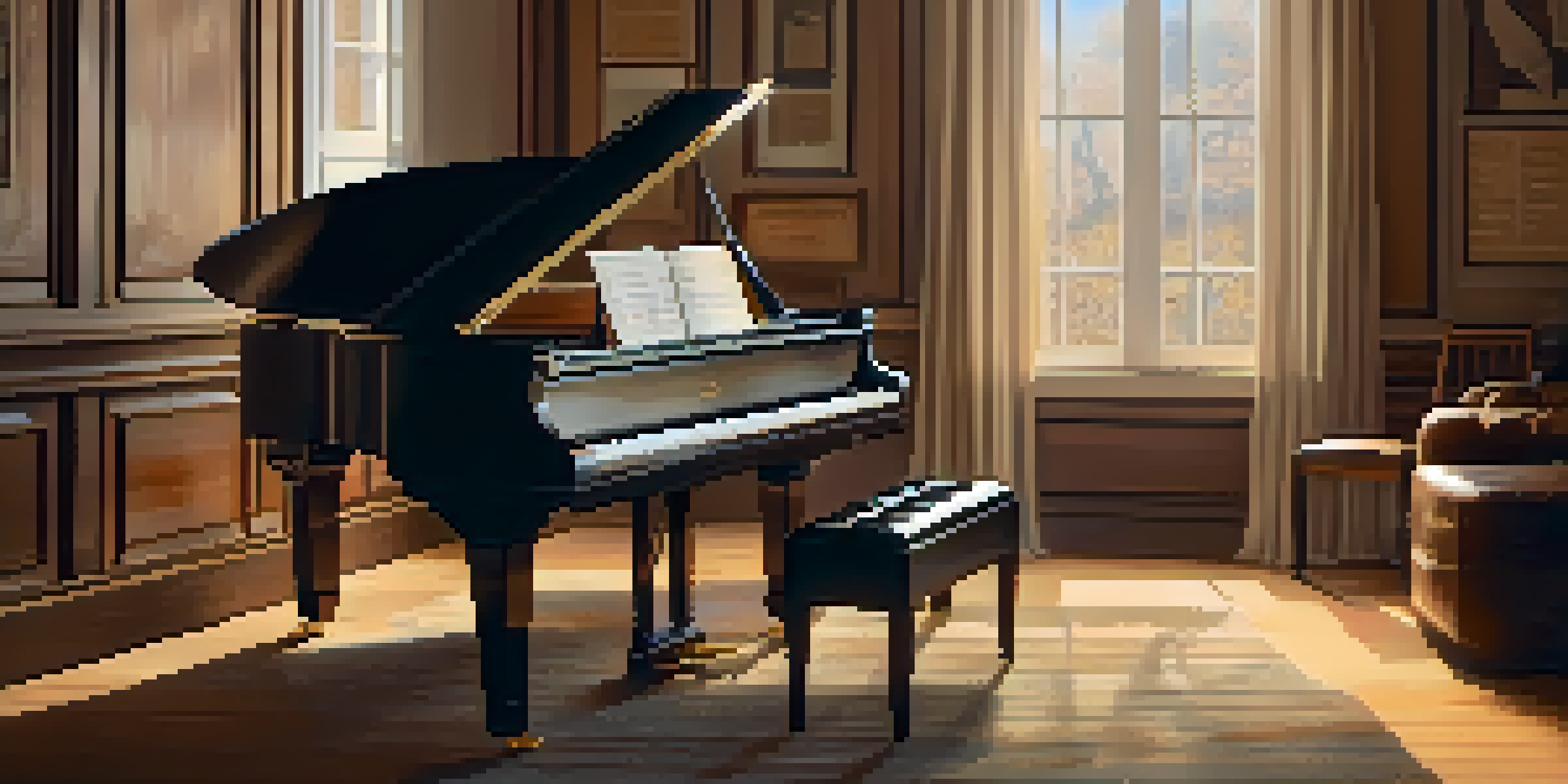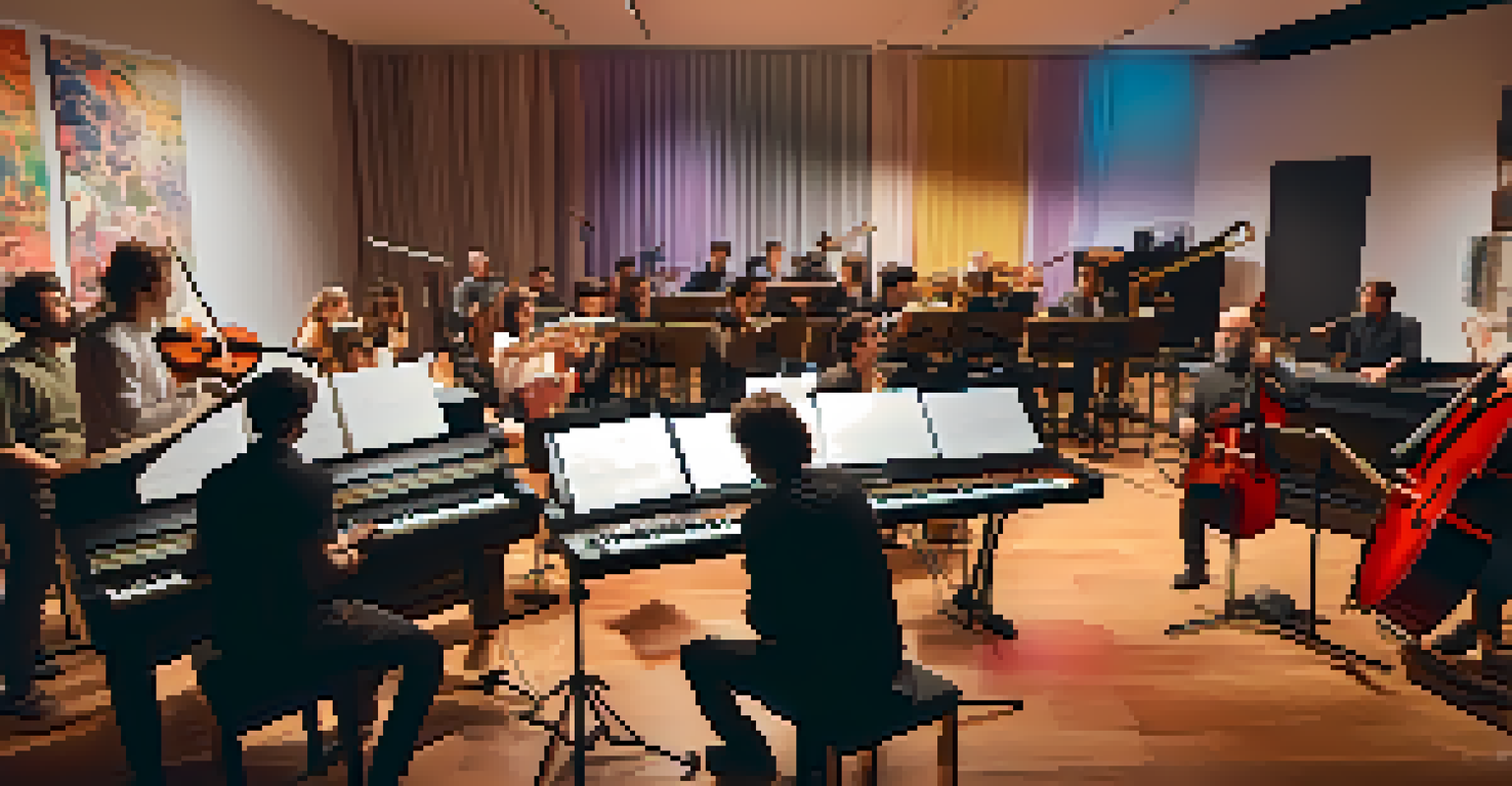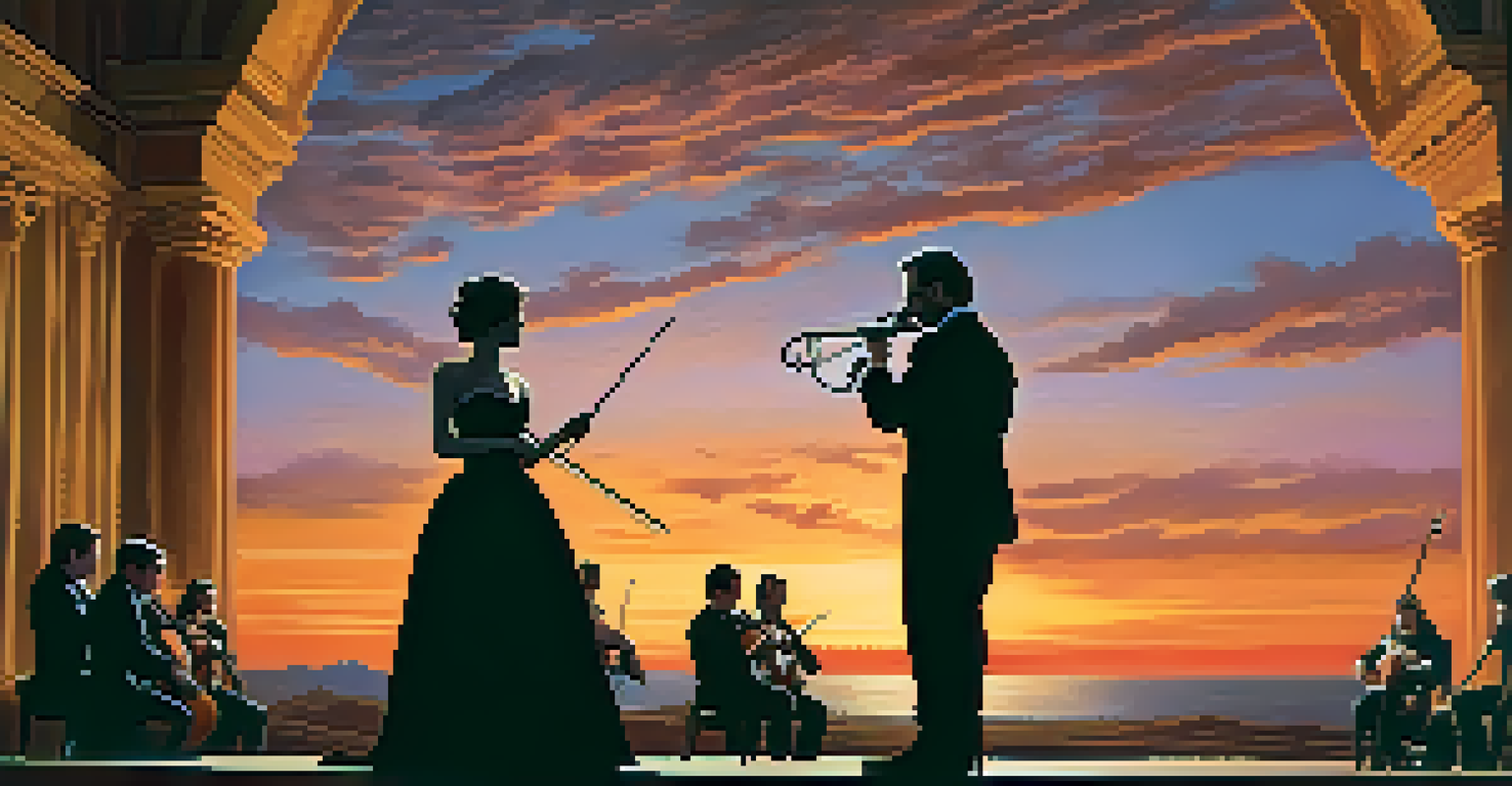Iconic Film Scores and Their Influence on Hollywood Classics

The Power of Music in Film: An Introduction
Music has a profound ability to evoke emotions, and in film, it serves as a powerful storytelling tool. From the haunting strings of a suspenseful scene to the triumphant brass of a victory moment, scores enhance the viewer's experience. Think about how the opening notes of a theme can transport you to a specific time and place, setting the tone for the entire film.
Music is the shorthand of emotion.
In Hollywood, iconic film scores have become synonymous with the movies themselves, often overshadowing the dialogue. When you hear John Williams' 'Imperial March,' it’s impossible not to think of Darth Vader. This symbiotic relationship between film and music not only enriches the narrative but also cements the film's legacy in popular culture.
As we dive deeper into iconic scores, we'll explore how they have influenced not just individual films but the broader landscape of Hollywood storytelling. These melodies and harmonies have left a lasting imprint on the industry, shaping how stories are told and experienced.
The Golden Age: Classic Scores That Defined an Era
The Golden Age of Hollywood, spanning the 1930s to the 1960s, produced some of the most memorable film scores. Composers like Max Steiner and Erich Wolfgang Korngold created lush orchestral pieces that became benchmarks for emotional storytelling. Films like 'Gone with the Wind' and 'The Adventures of Robin Hood' are celebrated not just for their narratives but for their groundbreaking scores.

Steiner's ability to blend themes with character arcs made audiences feel more connected to the story. For example, the sweeping themes in 'Casablanca' perfectly captured the film's romantic tension and dramatic stakes. These scores were not merely background music; they were integral to the film’s fabric.
Music Enhances Film Storytelling
Film scores profoundly impact emotions and narratives, creating an immersive experience for viewers.
As these classic scores set the standard, they paved the way for future composers to innovate and experiment in ways that pushed storytelling even further. The influence of this era is still felt today, as modern filmmakers often draw inspiration from these timeless pieces.
The Impact of John Williams on Modern Film Music
John Williams is a name synonymous with iconic film scores, having crafted music for a plethora of beloved films. His work on franchises like 'Star Wars,' 'Jaws,' and 'Indiana Jones' has set a benchmark for emotional resonance in cinema. Williams' ability to create memorable themes has helped define characters and elevate their stories to legendary status.
The music is not just a reflection of the film, but also an extension of its narrative.
Take the 'Star Wars' theme, for instance; it’s not just music—it's a cultural phenomenon. The moment those notes play, audiences are instantly transported to a galaxy far, far away. Williams’ scores often serve to enhance the plot, providing signals of tension, joy, or sorrow that guide the viewer's emotional journey.
By blending traditional orchestration with innovative techniques, Williams has influenced a generation of composers who seek to replicate his success. His legacy continues to resonate, as new films often reference or pay homage to his unforgettable melodies.
The Role of Music in Establishing Genre
Film scores play a crucial role in establishing and reinforcing genre conventions. For instance, the ominous strings often heard in horror films create an atmosphere of dread, while upbeat jazz rhythms might evoke the excitement of a heist. Composers like Hans Zimmer and Danny Elfman have mastered the art of genre-specific scoring, crafting soundscapes that enhance storytelling.
In Westerns, for example, Ennio Morricone's scores brilliantly capture the essence of the American frontier. His use of unconventional instruments and haunting melodies in 'The Good, the Bad and the Ugly' became synonymous with the genre itself. This ability to mold music to fit genre expectations helps audiences instantly recognize the tone of a film.
John Williams' Lasting Influence
John Williams' iconic scores have defined cinematic moments and inspired generations of composers.
As genres evolve, so too does their music. Contemporary scores often blend multiple genres, reflecting the complexity of modern storytelling and appealing to diverse audiences, proving that music remains a dynamic force in film.
Influential Composers Who Shaped Film Music
Throughout cinematic history, several composers have left an indelible mark on the art of film scoring. Beyond Williams, figures like Bernard Herrmann, whose work on 'Psycho' and 'Vertigo' defined psychological thrillers, showed how music could manipulate audience emotions. Herrmann's use of strings in 'Psycho' created one of the most iconic scenes in film history—the shower scene.
Similarly, composers like Rachel Portman and Hans Zimmer have brought fresh perspectives to the industry. Portman's scores often blend classical and contemporary elements, while Zimmer's innovative use of electronic music has reshaped action and drama narratives. Their contributions have expanded the sound palette available to filmmakers.
These composers not only enhance individual films but also influence future generations of musicians. Their legacies inspire emerging talents who continue to push the boundaries of what film music can achieve.
The Evolution of Film Scores in the Digital Age
As technology advances, so too does the landscape of film scoring. The digital age has brought about new tools and techniques, allowing composers to experiment in ways previously unimaginable. With software that mimics orchestral sounds and digital instruments, filmmakers can create rich soundscapes without the need for a full orchestra in every instance.
However, this evolution raises questions about authenticity. While digital scores can be impressive, some argue that they lack the warmth and human touch of traditional orchestration. Yet, composers are finding ways to blend both worlds, integrating live performances with digital enhancements for a richer auditory experience.
Evolution of Scores in Digital Age
The digital age has transformed film scoring, blending traditional techniques with innovative technology.
This fusion of technology and artistry is reshaping how scores are created and perceived, ensuring that the art of film scoring continues to evolve. As we move forward, the balance between innovation and tradition will be key in crafting the soundtracks of tomorrow.
The Lasting Legacy of Iconic Film Scores
The legacy of iconic film scores extends far beyond the films themselves. They have a unique way of embedding themselves into our cultural consciousness, often being referenced in other media, commercials, and even everyday life. Who hasn’t hummed the 'Titanic' theme during a romantic moment or felt a shiver at the sound of the 'Halloween' theme?
These memorable scores have the power to evoke nostalgia and emotional responses long after the credits roll. They serve as a reminder of the stories and characters that have touched our lives, creating a deep connection between audiences and cinema. This connection underscores the importance of music in storytelling, solidifying its role as a key player in the film industry.

As new generations discover these timeless scores, their influence continues to shape the landscape of film music. The emotional weight they carry ensures that they remain relevant, inviting audiences to revisit the classics and appreciate the artistry behind these unforgettable compositions.